Related Research Articles
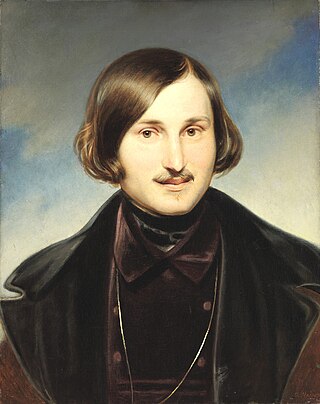
Nikolai Vasilyevich Gogol was a Russian novelist, short story writer and playwright of Ukrainian origin.
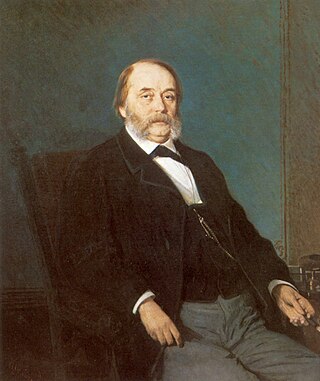
Ivan Alexandrovich Goncharov was a Russian novelist best known for his novels The Same Old Story (1847), Oblomov (1859), and The Precipice. He also served in many official capacities, including the position of censor.
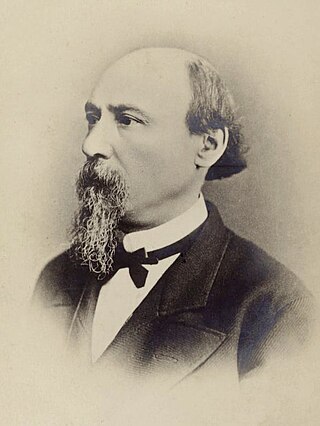
Nikolay Alexeyevich Nekrasov was a Russian poet, writer, critic and publisher, whose deeply compassionate poems about the Russian peasantry made him a hero of liberal and radical circles in the Russian intelligentsia of the mid-nineteenth century, particularly as represented by Vissarion Belinsky and Nikolay Chernyshevsky. He is credited with introducing into Russian poetry ternary meters and the technique of dramatic monologue. As the editor of several literary journals, notably Sovremennik, Nekrasov was also singularly successful and influential.

Vissarion Grigoryevich Belinsky was a Russian literary critic of Westernizing tendency. Belinsky played one of the key roles in the career of poet and publisher Nikolay Nekrasov and his popular magazine Sovremennik. He was the most influential of the Westernizers, especially among the younger generation. He worked primarily as a literary critic, because that area was less heavily censored than political pamphlets. He agreed with Slavophiles that society had precedence over individualism, but he insisted the society had to allow the expression of individual ideas and rights. He strongly opposed Slavophiles on the role of Orthodoxy, which he considered a retrograde force. He emphasized reason and knowledge, and attacked autocracy and theocracy.
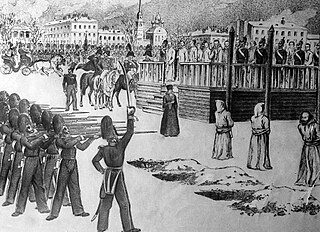
The Petrashevsky Circle was a Russian literary discussion group of progressive-minded intellectuals in St. Petersburg in the 1840s. It was organized by Mikhail Petrashevsky, a follower of the French utopian socialist Charles Fourier. Among the members were writers, teachers, students, minor government officials and army officers. While differing in political views, most of them were opponents of the tsarist autocracy and Russian serfdom. Like that of the Lyubomudry group founded earlier in the century, the purpose of the circle was to discuss Western philosophy and literature that was officially banned by the Imperial government of Tsar Nicholas I. Among those connected to the circle were the writers Dostoevsky and Saltykov-Shchedrin, and the poets Aleksey Pleshcheyev, Apollon Maikov, and Taras Shevchenko.
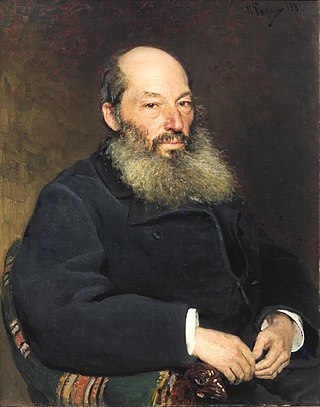
Afanasy Afanasyevich Fet, later known as Shenshin, was a renowned Russian poet regarded as the finest master of lyric verse in Russian literature.

Apollon Nikolayevich Maykov was a Russian poet, best known for his lyric verse showcasing images of Russian villages, nature, and history. His love for ancient Greece and Rome, which he studied for much of his life, is also reflected in his works. Maykov spent four years translating the epic The Tale of Igor's Campaign (1870) into modern Russian. He translated the folklore of Belarus, Greece, Serbia and Spain, as well as works by Heine, Adam Mickiewicz and Goethe, among others. Several of Maykov's poems were set to music by Russian composers, among them Rimsky-Korsakov and Tchaikovsky.

Aleksey Nikolayevich Pleshcheyev was a radical Russian poet of the 19th century, once a member of the Petrashevsky Circle.

Sovremennik was a Russian literary, social and political magazine, published in Saint Petersburg in 1836–1866. It came out four times a year in 1836–1843 and once a month after that. The magazine published poetry, prose, critical, historical, ethnographic and other material.

Valerian Nikolayevich Maykov was a Russian writer and literary critic, son of painter Nikolay Maykov, brother of poet Apollon and novelist Vladimir Maykov. Valerian Maykov, once a Petrashevsky Circle associate, was considered by contemporaries as heir to Vissarion Belinsky's position of Russia's leading critic, and later credited for being arguably the first in Russia to introduce scientific approach to the art of literary criticism.

Stepan Petrovich Shevyryov was a conservative Russian literary historian and poet, a virulent critic of "the rotting West", and leading representative of the Official Nationality theory.
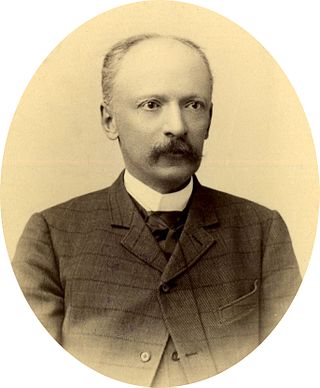
Vasily Grigorievich Avseenko was a Russian literary critic, writer and journalist.
Two Fates is a poem by Apollon Maykov, first published in 1845 in Saint Petersburg, as a separate edition, under the title "Two Fates. A Real Story by A.N.Maykov" and with considerable censorship cuts. It hasn't been re-issued in the author's lifetime and first appeared in its original form in The Selected Works by A.N.Maykov.
Three Deaths is a lyric drama by Apollon Maykov. Its original version, called "The Choice of Death", finished in 1851, had problems with censorship and was first published, severely cut, under the title Three Deaths in 1857, in the October (No.10) issue of Biblioteka Dlya Chtenyia. The final version of it appeared in the Complete A.N. Maykov (1893).
Two Worlds is a tragedy in verse by Apollon Maykov first published in February 1882 issue of The Russian Messenger. It represents the final part of the poetic cycle dealing with the conflict between paganism and Christianity. In 1882 Two Worlds won its author the Pushkin Prize for literature and was hailed as his most prominent work to date.
The Wanderer is a poem by Apollon Maykov, first published in the No.1, January 1867 issue of The Russian Messenger. It was dedicated to Fyodor Tyutchev and subtitled: "First part of the drama The Thirsty One".
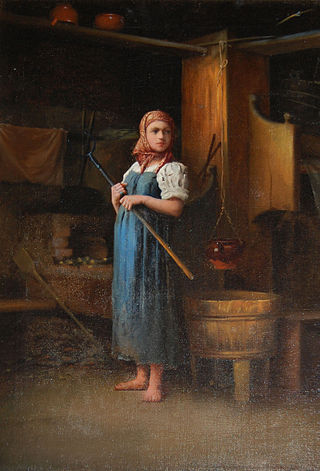
The Village was the debut novel of Dmitry Grigorovich, first published by Otechestvennye Zapiski in 1846. It had strong impact upon the Russian literary society and was praised for being "the first work in the Russian literature to face the real peasants life" by Ivan Turgenev.
Natural School is a term applied to the literary movement which arose under the influence of Nikolai Gogol in the 1840s in Russia, and included such diverse authors as Nikolai Nekrasov, Ivan Panayev, Dmitry Grigorovich, Ivan Turgenev, Alexander Hertzen, Ivan Goncharov, Vladimir Dal, Mikhail Saltykov-Shchedrin, Fyodor Dostoyevsky and Evgeny Grebyonka, among others. Modern day Russian historians of literature use the term only in its historical context, otherwise preferring to speak of "the earliest stage of critical realism in Russia."

Sergey Fyodorovich Durov was a Russian poet, translator, writer, and political activist. A member of the Petrashevsky Circle and later the leader of his own underground group of intellectuals, Durov was arrested in 1849 and spent 8 months in the Petropavloskaya Fortress, followed by 4 years in Omsk prison.
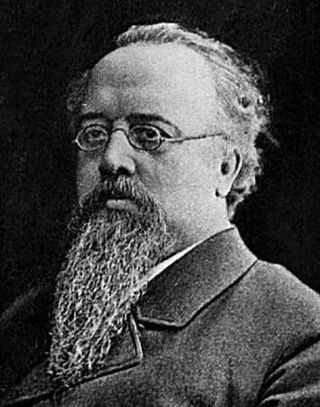
Dmitry Dmitriyevich Minayev was a Russian poet, parodist, journalist, translator and literary critic.
References
- 1 2 Mayorova, O.E. (1990). "A.N.Maykov". Russian Writers. Bibliographical dictionary. (Ed. P.A.Nikolayev). Vol. 2 Moscow Prosveshchenye Publishers. Retrieved 2012-12-01.
- 1 2 3 4 Pryima, Fyodor (1984). "A.N.Maykov's Poetry". Pravda Publishers. Retrieved 2012-03-01.
- ↑ The Complete Belinsky. Vol. VI, 427, 661.
- ↑ Yampolsky, I. (1968). "Apollon Maykov. Russian Poets". Moscow. Detskaya Literatura Publishers. Retrieved 2012-12-01.